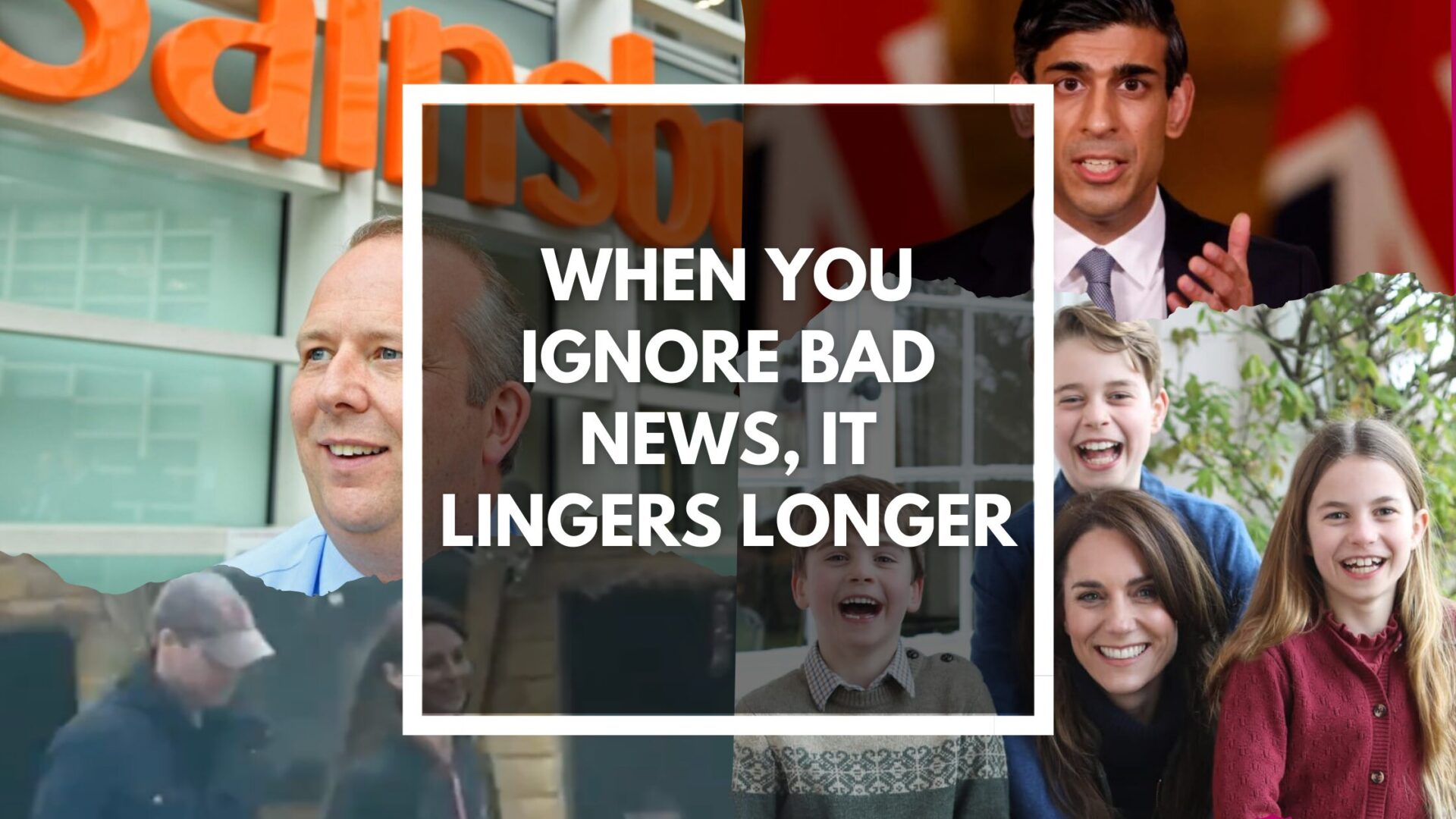By Roz Morris, Managing Director, TV News London Ltd
When bad news strikes – don’t ignore it. Don’t slow down. Speed up your responses. Seize the day. Seize the initiative and get your own narrative out fast. That’s the message for good media management in a crisis.
This month an example of getting this right was the swift reaction by Sainsburys to customers anger over difficulties in deliveries and payments caused by IT problems. The day after this happened Sainsbury’s CEO Simon Roberts sent out an apology email to customers signed by himself. This was a swift and appropriate reaction to a business problem in the age of social media.
Sadly, it seems both the British Royal Family and the current Conservative Government still haven’t got the message on vital strategies for swift and successful news media management.
Social media fuels conspiracy theories
It has always been a central pillar of crisis media management that in the absence of a convincing narrative a news vacuum will be filled with rumours. This was the case before social media existed, but in the 21st century, rumours can spread around the world in seconds. Conspiracy theories can stand up and acquire ‘legs’, as journalists and PR’s put it, and start running round the world driven by the immense reach of social media.
I’m saying that the UK government and the royal family still haven’t got the message because, both have been slow to react to difficult issues, which they could have handled better.
The Princess of Wales and the media
For the royals, there has been the so-called ‘mystery’ of what the surgery is that the Princess of Wales is recovering from, plus the current state of her health, and then the whole situation made even worse by the obviously photoshopped family picture.
This has attracted worldwide attention, not least in the US where there has been widespread mockery of the royals on both social and traditional media. What can the royal family do about this?
Perhaps they should have more people advising them who understand the media-driven world we all now live in. Firstly, they could give us more facts right from the start, and secondly, take much more care with the photos they issue to the media. Having a royal photo effectively banned by major photo agencies is a terrible own goal. It is hard for the royals to speak out on media criticism but doing more to get positive and accurate information to the public is essential.
UK government slow on racism issue
Meanwhile, Rishi Sunak spent far too long dithering over sending out clear messages of condemnation for comments by both Lee Anderson and Frank Hester.
Dominic Cummings driving during lockdown
This kind of very poor news management from a Conservative government is not new. When the row first erupted over Dominic Cummings driving around during lockdown when he was a top aide to then Prime Minister Boris Johnson, there was also a similar attitude at Number Ten of ‘if you ignore the fuss it will go away’.
And of course, it didn’t. The big question was: why was the Prime Minister’s Senior Aide driving hundreds of miles to stay with relatives in the North of England when the Government’s own lockdown rules appeared to make it clear that no- one should drive anywhere?
Just like the recent row over big Tory donor Frank Hester and his clearly racist remarks about Britain’s first black female MP Diane Abbott, the row over Dominic Cummings just rumbled on. And on. Creating more and more negative headlines.
There was no apology even when Dominic Cummings took the extraordinary step of giving his own press conference in the garden at Number Ten Downing Street.
Many commentators attribute the start of widespread public dissatisfaction with the Conservative Party to the Cummings driving saga, with a straight line to the Partygate scandals which were among the issues which eventually led to the toppling of Boris Johnson as prime minister.
Frank Hester ‘remarks not racist’
On 11 March, The Guardian reported that in 2019 Tory donor, Frank Hester said: “It’s like trying not to be racist but you see Diane Abbott on the TV, and you’re just like I hate, you just want to hate all black women because she’s there, and I don’t hate all black women at all, but I think she should be shot.”
In a statement, Mr Hester’s company said he “accepts that he was rude about Diane Abbott in a private meeting several years ago, but his criticism had nothing to do with her gender nor colour of skin”.
This appeared to be an example of the world of Humpty Dumpty in the book ‘Alice in Wonderland’ who famously said: “When I use a word, it means just what I want choose it to mean – neither more nor less.”
Rishi Sunak, Britain’s first prime minister of Asian descent, is reportedly unwilling to make race a big issue in his politics and he sent out his ministers to say that reported remarks by Tory party donor the millionaire businessman Frank Hester were not racist or misogynist.
All change – Yes the remarks were racist
It took Kemi Badenoch, the only black woman in the cabinet to point out that these remarks were clearly racist. Rishi Sunak then changed his statements and three days later on 14 March said in parliament: “The alleged comments were wrong, they were racist, he has rightly apologised for them, and that remorse should be accepted. There is no place for racism in Britain, and the government I lead is living proof of that.”
This change of tune made the prime minister look indecisive and not nimble enough to deal swiftly with tricky political issues. Meanwhile, a row continues over whether the Conservative party should now keep Frank Hester’s substantial donations or hand the money back.
This was always going to be a damaging issue for the UK government, but if the prime minister had called it out as a racist statement right from the start, it would not have been as damaging to himself and his authority.
Crisis issues cannot all be solved positively, but there is an art to damage limitation, getting your messages out fast and not actually making things worse by a slow or ineffective response.
To find out how TV News London can help you to get your messages across clearly in the media email us at info@tvnewslondon.co.uk or call +44 408 275 8854.




